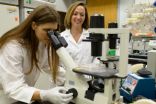Physicians play a critical role in ensuring bladder cancer patients
Understand the link between smoking and their disease
2014-11-10
(Press-News.org) When bladder cancer patients are well-informed by their physicians, they acknowledge that tobacco use was likely the cause of their disease. The finding comes from a new study published early online in CANCER, a peer-reviewed journal of the American Cancer Society. Patients with such knowledge may be more motivated to quit smoking, which could help prolong their lives.
At least half of bladder cancer cases diagnosed in the United States are the result of cigarette smoking. Bladder cancer is the second most common tobacco-related malignancy, a fact that is not well known even among bladder cancer surgeons, let alone the general public. Quitting smoking after cancer diagnoses can prolong survival, improve cancer prognoses, and decrease the risk of developing second cancers.
"For people who are smoking at the time of a cancer diagnosis, the first step in wanting to quit is knowing that smoking caused the cancer and that continuing to smoke will result in additional harm," said Jeffrey Bassett, MD, MPH, of the University of California, Los Angeles. He and his colleagues designed a study to characterize patients' knowledge of the link between tobacco use and bladder cancer risk, and to assess the impact that different sources of information have on patients' knowledge and beliefs regarding the cause of their bladder cancer.
The researchers surveyed a random sample of 790 bladder cancer survivors diagnosed between 2006 and 2009 in California. Sixty-eight percent had a history of tobacco use, and 19 percent were active smokers at the time of diagnosis. Tobacco use was the most cited risk factor for bladder cancer, with active smokers more knowledgeable than former or never smokers (90 percent versus 64 percent versus 61 percent). Urologists were patients' predominant source of information, cited most often by active smokers (82 percent). Calculations revealed that active smokers had a 6.37 times greater likelihood than never smokers of acknowledging tobacco use as a risk factor for bladder cancer, and smokers who named the urologist as their information source had a 2.80 times greater likelihood of believing tobacco use caused their cancer.
The study is the first to establish that informed bladder cancer patients readily accept that their smoking caused their cancer, debunking the myth that smokers refuse to acknowledge the negative health consequences of their tobacco use, according to Dr. Bassett. "Our findings also highlight the importance of the diagnosing physician in making sure that their patients are aware of the role that smoking played in their new cancer diagnosis. Patients who have this knowledge are better equipped to use the cancer diagnosis as motivation for quitting smoking, thereby improving their odds of survival."
INFORMATION:
ELSE PRESS RELEASES FROM THIS DATE:
2014-11-10
Businesses report that U.S. military veterans make excellent employees, but companies still experience challenges locating and hiring them, according to a new RAND Corporation report.
Studying a group of companies that have made a major commitment to hire veterans, researchers concluded that challenges remain for veterans seeking civilian jobs and employers hoping to hire them, including continuing difficulty understanding the match between military skills and civilian job requirements.
Too often veterans believe their talents apply only in the security or defense ...
2014-11-10
The child-mortality gap has narrowed between the poorest and wealthiest households in a majority of more than 50 developing countries, a new study from the Stanford University School of Medicine has found.
This convergence was mostly driven by the fact that child-mortality rates declined the fastest among the poorest families. In the countries where the gap increased, the study identified a common thread: poor governance.
The findings provide important information for making decisions about prioritizing global health investments to effectively promote equity, said ...
2014-11-10
JACKSONVILLE, Fla. -- Researchers at Mayo Clinic's campus in Jacksonville say they have identified first steps in the origin of pancreatic cancer and that their findings suggest preventive strategies to explore.
In an online issue of Cancer Discovery, the scientists described the molecular steps necessary for acinar cells in the pancreas -- the cells that release digestive enzymes -- to become precancerous lesions. Some of these lesions can then morph into cancer.
"Pancreatic cancer develops from these lesions, so if we understand how these lesions come about, we may ...
2014-11-10
This news release is available in French.
VIDEO:
Arthritis pain in dogs can be relieved, with no side effects, by a new product based on medicinal plants and dietary supplements that was developed at the University of Montreal's...
Click here for more information.
Arthritis pain in dogs can be relieved, with no side effects, by a new product based on medicinal plants and dietary ...
2014-11-10
A team of researchers led by Michele Fumagalli from the Extragalactic Astronomy Group and the Institute for Computational Cosmology at Durham University, were among the first to use ESO's Multi Unit Spectroscopic Explorer (MUSE) instrument on the VLT. Observing ESO 137-001 -- a spiral galaxy 200 million light-years away in the southern constellation of Triangulum Australe (The Southern Triangle) -- they were able to get the best view so far of exactly what is happening to the galaxy as it hurtles into the Norma Cluster.
MUSE gives astronomers not just a picture, but provides ...
2014-11-10
Dublin, Ireland, November 9th 2014 - Botanists at Trinity College Dublin have launched a database with information that documents significant 'life events' for nearly 600 plant species across the globe. They clubbed together with like-minded individuals working across five different continents to compile the huge database of plant life histories, for which data have been gathered over a near 50-year span.
At a time in which climate change and increasing human populations are rapidly re-shaping plant distributions, the researchers hope their COMPADRE Plant Matrix database ...
2014-11-10
Bobbing your head, tapping your heel, or clapping along with the music is a natural response for most people, but what about those who can't keep a beat?
Researchers at McGill University and the University of Montreal, have discovered that beat-deafness, though very rare, is a problem not simply of how people feel a pulse or move their bodies, but instead, how people synchronize with sounds they hear.
"We examined beat tracking, the ability to find a regular pulse and move with it, in individuals who complained of difficulty following a beat in everyday activities ...
2014-11-09
JACKSONVILLE, Fla. -- All patients with hepatitis C who receive a liver transplant will eventually infect their new livers. These transplanted organs then require anti-viral treatment before they become severely damaged. But traditional post-transplant hepatitis C therapy can take up to a year, is potentially toxic and can lead to organ rejection.
Now, at the American Association for the Study of Liver Diseases (The Liver Meeting® 2014) in Boston, researchers at Mayo Clinic report that use of two new oral medications post-transplant is safe and beneficial, and requires ...
2014-11-08
Berlin, Germany (November, 2014) - Sweating, panting, moving to the shade, or taking a dip are all time-honored methods used by animals to cool down. The implicit goal of these adaptations is always to keep the brain from overheating. Now a new study shows that armor-plated dinosaurs (ankylosaurs) had the capacity to modify the temperature of the air they breathed in an exceptional way: by using their long, winding nasal passages as heat transfer devices.
Led by paleontologist Jason Bourke, a team of scientists at Ohio University used CT scans to document the anatomy ...
2014-11-07
GAINESVILLE, Fla. -- Noroviruses are pernicious intestinal viruses. They cause violent vomiting and diarrhea, and people ill with the virus remain contagious up to three days after they seem to recover.
Although a vaccine for these viruses is in clinical trials, there is still no medication to combat them. That's in part because researchers have not been able to culture human noroviruses so they can test potential treatments -- until now, according to a study by University of Florida Health researchers published Friday, Nov. 7 in the journal Science.
UF Health researcher ...
LAST 30 PRESS RELEASES:
[Press-News.org] Physicians play a critical role in ensuring bladder cancer patients
Understand the link between smoking and their disease



